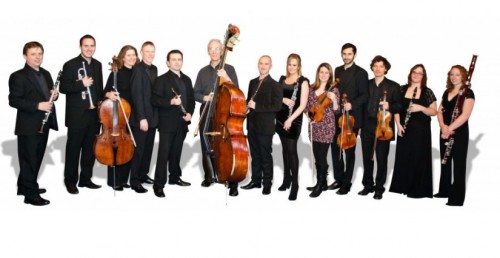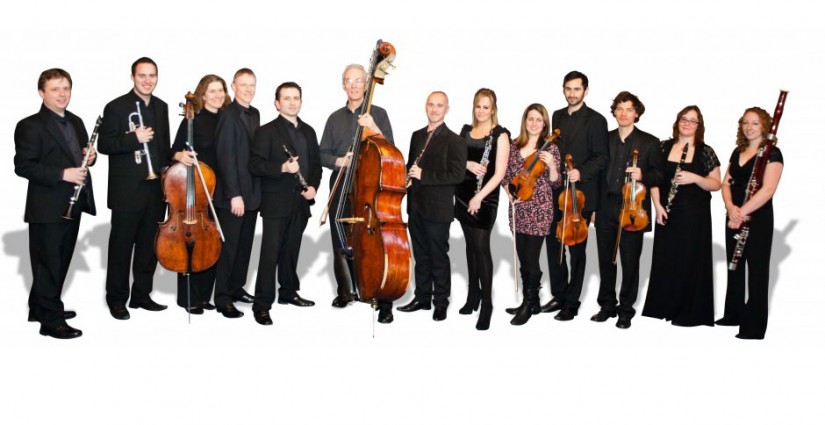 United Kingdom Anniversary Finale and Composers Spotlight: Ensemble Cymru. Chapter Arts Centre, Cardiff, 4.5.2018. (PCG)
United Kingdom Anniversary Finale and Composers Spotlight: Ensemble Cymru. Chapter Arts Centre, Cardiff, 4.5.2018. (PCG)

Anniversary Concert
Handel – Harp Concerto
Rhian Samuel – Emerging (Lightly) for viola and chamber ensemble
Bax – Nonet
Debussy – Dances for harp and string quintet
Gareth Glyn – To the Four Winds, world première
Spotlight
Gareth Churchill – Annwn, Westholm, Southill
Ensemble Cymru mounted this concert as part of a tour commemorating their fifteenth anniversary season. For the purpose, the flexible ensemble had increased to nine players, giving them not only the opportunity to schedule Bax’s rarely-heard Nonet but also Gareth Glyn’s newly commissioned work. The Nonet, which concluded the first half of the programme, demonstrated the sheer volume of sound that the composer could evoke from a relatively small number of players, developing the textures into a full-blooded romanticism and even conjuring a hint of violence in places (it is a fallacy to pigeon-hole Bax’s music as pure ‘Celtic twilight’). The work falls into two substantial movements. They are both rhapsodic in form but the second also contains elements of dance music in the style of a jig before it settles down into a quintessentially Baxian epilogue, reflecting on earlier material before reaching a conclusion. As is often the case with Bax, the freely developing construction can sometimes seem diffuse; but there is nonetheless a solid sense of architecture underlying the music, and much of it is very beautiful indeed. The nine players clearly relished the emotional undertow of the work, and the soaring string lines were encompassed with great style.
The Nonet had been preceded by a brisk and engaging performance of Handel’s Harp Concerto (the one familiar to us through its use in Alexander’s Feast) and was followed, at the beginning of the second half of the concert, with a performance of Debussy’s Danses sacrée et profane in the edited version for conventional double-action harp and solo string quintet. The work, originally written for the now rarely encountered Pleyel chromatic harp, requires some minor amendment when it is played on the normal modern instrument; Anne Denholm coped bravely with the multifarious pedal changes which are required, and the playing of the string quintet was such as to obviate any regret for the string orchestral scoring. In the first half we also heard Rhian Samuel’s somewhat inelegantly titled Emerging (Lightly), originally written in 2008, which was introduced by the composer herself. The title is however a very accurate description of the music: a soulfully sculpted folk-like melody slowly unfolds from a background of scherzo-like figurations of a sprightly nature, finally rising to a pitch of emotion before subsiding back briefly into the skittering opening material. Oliver Wilson made much of the richly contoured melodic lines which the composer had vouchsafed him.
The concert concluded with the first performance of Gareth Glyn’s To the four winds, specifically commissioned for this anniversary tour. The composer – characterful as always – provided a lively and amusing introduction to the four movements of his piece. He described the manner in which the general description of the Greek gods governing the winds had been expanded to encompass a series of myths and legends regarding their characters and deeds, not all of which were entirely creditable. This certainly helped the audience to appreciate the many illustrative touches which the composer introduced into the music, although the final movement describing the contest between Boreas and Helios was in places over-literal in the chromatic runs and blustering elements depicting the storm; and the final pages with its Ravellian sunlight-drenched textures could perhaps have been more extended to provide a really clinching conclusion. Nonetheless there were many incidental beauties along the way; the lament of Alcyone which brought the first movement to a conclusion was both heartfelt and emotionally engaging. And the third movement, a depiction of the love of Zephyros, was a really magical invention which rose to soaring heights and exploited the range of sounds available from the nine instruments in a masterly fashion. Might it be regarded as improper to suggest that the work as a whole might even benefit from expansion into a work for full orchestra? Not that this is intended in any way to imply criticism of the playing of the ensemble, who produced magnificently rich tone in the many passages of lyricism, as well as coruscating playing of the rhythmic passages.
The ensemble is taking this same programme on tour to Aberystwyth Arts Centre on 6 May and Bangor Pontio on 13 May, and I would very much hope that local audiences in these venues will feel inspired to attend these events; they will hear some extraordinarily good music and playing. And each of these concerts will be preceded by a half-hour ‘composers spotlight’ where the music of a contemporary Welsh composer will be featured together with a chance to talk and discuss the works with the writers themselves – Rhian Samuel in Aberstwyth and Guto Puw in Bangor. These spotlights are being promoted by Composers of Wales (of which organisation I am the secretary) in conjunction the Welsh music archive Tŷ Cerdd and Ensemble Cymru themselves. The music will also feature on a forthcoming CD release from the Tŷ Cerdd label.
At the spotlight in Cardiff, the music featured was that of Gareth Churchill. (A couple of months ago, I reviewed for these pages the performance of his Concentrations by the BBC National Orchestra of Wales.) Here we were given the opportunity to hear two works for solo strings, part of a recently composed set centred around the four compass points. Indeed Southill, for solo double bass, was here receiving its first performance. Mike Escreet made much of the chugging rhythms of this lively piece, where an almost unrecognisable folk melody underpinned the harmonic shape of the music. Heather Bills brought a sense of winsome style to the limping 7/8 ‘gigue’ which in some ways seemed to echo Bach’s suites for the solo cello. The most substantial piece here was Annwn for solo harp, which displayed mythological echoes from the Welsh Mabinogion cycle. There were three contrasted thematic elements: strummed chords whose purposeful sense of motion reminded me fleetingly of moments in the slow movement of William Mathias’s Harp Concerto; delicate filigree ornamentation which began in the highest register and slowly descended into the more resonant depths; and lightly slapped rhythms delivered on the strings with the palm of the hand, which were coupled with a marvellously imagined series of piquant effects which never outstayed their welcome or became repetitive. The soloist Ben Creighton-Griffiths observed during the conversations which formed part of the spotlight that it was a pleasant relief (and, one suspected, possibly a surprise) to find a composer who really understood the nature of the harp and did not just treat it as a sort of vertical piano. The items in the spotlight, as in the ensemble concert, were ably and engagingly introduced by Peryn Clement-Evans.
Paul Corfield Godfrey
For more about Ensemble Cymru click here.
